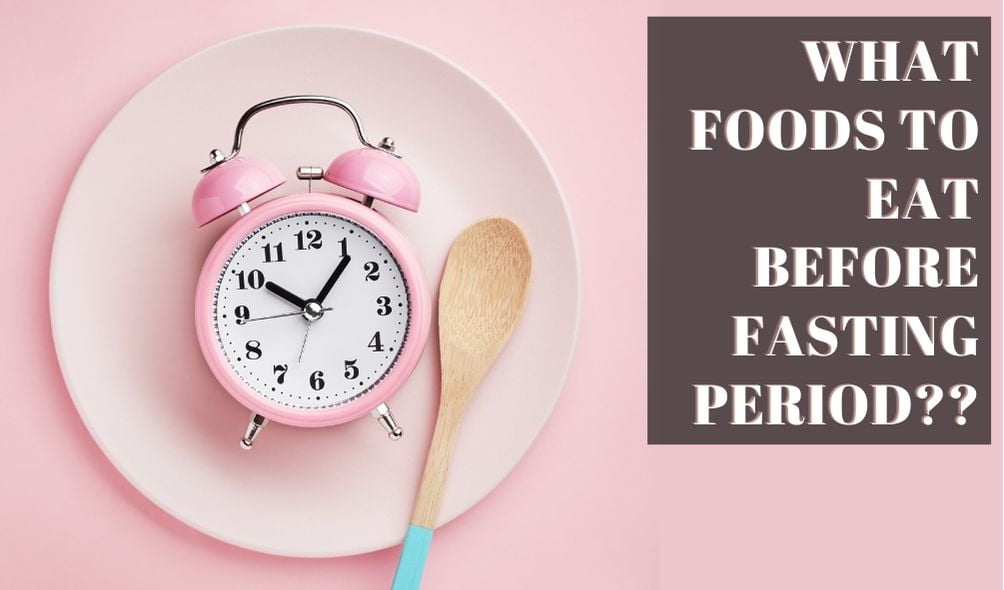Embarking on an intermittent fasting journey involves strategic choices, especially when it comes to pre-fasting meals. In this exploration of what foods to eat before the fasting period, we delve into the optimal choices that not only satiate but also support your fasting goals. Join us as we navigate the landscape of pre-fasting nutrition, offering insights into maximizing the benefits of intermittent fasting with the right food choices.
What Foods to Eat Before Fasting Period On Intermittent Fasting
If you’re looking for some undefined pre-fast meal suggestions, there are a few basic things you can keep in mind. First, try to focus on healthier diet options that will give you the energy you need to make it through your fasting period. Secondly, make sure to eat plenty of protein and fiber to help you feel satisfied. Finally, if you’re looking for something sweet, try to go for something like fruit instead of processed snacks.
Intermittent Fasting Benefits & How It Changes Your Body. Check out.
Fasting is not easy, but it can be a very rewarding experience. Before you begin your fast, make sure you stock up on healthy foods to eat.
Some good options include fruits, vegetables, whole grains, and lean protein. As with all diets, making sure to stay well hydrated is important, so drink lots of water.
Lean protein
Lean protein includes skinless poultry, white meat fish, and low-fat cottage cheese. Generally, proteins promote weight management if you eat them in moderation. Also, it helps you stay full for a long period which is what you need on intermittent fasting.
Fish and seafood
In addition to being high in healthy fats, omega-3, and protein, they also contain a lot of vitamin D.
Cruciferous vegetables
Broccoli, Brussels sprouts, and cauliflower are all high in the f-word – fiber.
Legumes
Legumes like lentils, beans, and chickpeas are rich in vitamins, minerals, carbohydrates, and proteins.
Including low-calorie carbohydrates like beans and legumes in your diet will keep you awake throughout your fasting hours.
Furthermore, meals including chickpeas, black beans, peas, and lentils have been demonstrated to reduce body weight even when no calories are restricted.
Also, it takes a longer time for your digestive system to process, which is why it keeps you full for a long time.
What you can consume during the fasting period
During the fasting period of intermittent fasting, it’s crucial to abstain from consuming calories. However, non-caloric beverages such as water, black coffee, and herbal teas are generally allowed and can help keep you hydrated. These options provide the benefits of staying quenched without interrupting the physiological effects of fasting. It’s essential to avoid anything that may spike insulin levels or contribute substantial calories during the fasting window to preserve the metabolic state intended by intermittent fasting. Always consult with a healthcare professional or nutritionist to ensure that intermittent fasting aligns with your individual health needs.
Water
No doubt that drinking water is recommended for all types of diets, intermittent fasting isn’t an exception.
You can enjoy drinking water on fasting periods, also, carbonated water can with no calories can be a good choice.
Cup of water with apple cider vinegar
Apple cider vinegar can help you avoid cravings and stay hydrated while fasting. Dilute 1-2 tbsp of apple cider vinegar with one cup of water.
Coffee
Luckily, plain coffee without sugar, cream, or milk is good during fasting periods.
Herbal teas
You can enjoy all kinds of herbal teas including regular tea, ginger, peppermint, hibiscus, and anise. Just do not add any sugar.
Drinks that can break fasting if consumed in large amounts
Cappuccino MCT
During their fast, some individuals consume coffee with MCT oil, ghee, coconut oil, or butter. Oil breaks a fast, but it does not disrupt ketosis and can help you get through the day in between meals.
Check out MCT intermittent fasting cappuccino.
Bone broth soup
This nutrient-dense food can help restore electrolytes lost after prolonged durations of merely drinking water.
Check out 3-day bone broth fast weight loss results.
It’s important to note that any calorie-containing meals or beverages, including bone broth and the mentioned healthful fats, will technically interrupt your fasting period.
Small portions of these low-carb, high-fat, moderate-protein meals, on the other hand, will not knock your body out of ketosis.
Intermittent Fasting Types
Intermittent fasting is a dietary approach that cycles between periods of eating and fasting. There are several different intermittent fasting methods, but the most common one is the 16:8 method, which means you fast for 16 hours and eat during an 8-hour window.
There are several benefits to intermittent fasting which we discussed before.
Check out 10 Fasting Food Benefits.
There are several different intermittent fasting schedules, which take into account your eating habits and how long you can go without food. Here are the different schedules and their effects:
The 16:8 Method
This schedule involves fasting every other day for 16 hours. It is an effective method for fat loss and has been shown to lead to better overall results than alternate-day fasting.
The Warrior Diet
This schedule involves fasting for one day a week. It is an effective and healthy way to lose fat and improve other body parameters, such as insulin sensitivity.
How long should I do intermittent fasting to lose weight? Check out
In conclusion, crafting a mindful pre-fasting diet in the realm of intermittent fasting is pivotal for optimizing your fasting experience. Choosing the right foods before the fasting period can enhance satiety and align with your health objectives. So, as you embark on your intermittent fasting journey, consider these insights on “What Foods to Eat Before Fasting Period On Intermittent Fasting” to make informed and nourishing choices. Here’s to a successful and well-fueled fasting routine!
